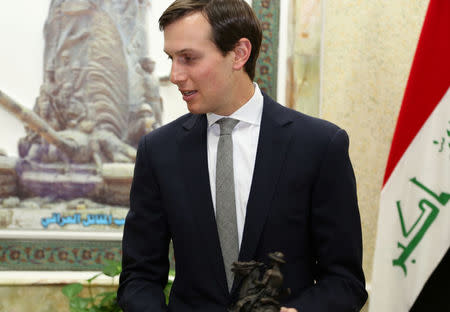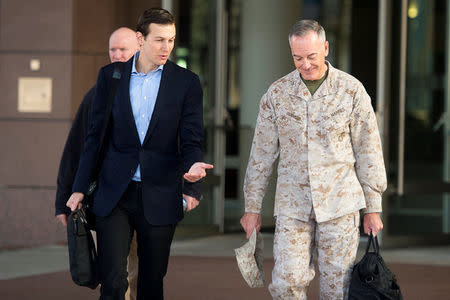Trump's son-in-law, Kushner, flies into Iraq with top U.S. general
By Phil Stewart BAGHDAD (Reuters) - U.S. President Donald Trump's son-in-law, Jared Kushner, flew into Iraq on Monday with the top U.S. general to get a first-hand assessment of the battle against Islamic State from U.S. commanders on the ground and Iraqi leaders. For Kushner, who has not been to Iraq before, the trip comes at a critical time as Trump examines ways to accelerate a U.S.-led coalition campaign that U.S. and Iraqi officials say has so far been largely successful in uprooting Islamic State militants in Iraq and Syria. The visit appears to demonstrate the far-reaching portfolio of Kushner, 36, who is part of Trump's innermost circle and who has been given a wide range of domestic and foreign policy responsibilities, including working on a Middle East peace deal. Marine General Joseph Dunford, the chairman of the U.S. military's Joint Chiefs of Staff, said he invited Kushner and Tom Bossert, White House homeland security adviser, to accompany him so they could hear "first-hand and unfiltered" from military advisers about the situation on the ground and interact with U.S. forces. "I said, 'Hey, next time I go to Iraq, if you're interested, come and it’d be good," Dunford said, adding he extended the invitation weeks ago. That kind of ground-level awareness of the war helps inform strategic decisions, Dunford said, adding it was the same reason he regularly leaves Washington to visit Iraq. "The more appreciation you could have for what's actually happening on the ground, the more informed you are when you start talking about the strategic issues," Dunford said. Kushner, who is married to Trump's daughter Ivanka Trump, did not speak with reporters. Trump campaigned on defeating Islamic State but has yet to announce any dramatic shift in war strategy. After arriving, Kushner joined Dunford for meetings with the U.S. ambassador to Baghdad and the senior American commander in Iraq, Lieutenant General Stephen Townsend. Dunford's delegation also met Iraq's Prime Minister Haider al-Abadi, whose office said their talks focused on the ongoing battle to retake the city of Mosul from Islamic State and U.S.-led coalition assistance, including aiding civilians displaced by the fighting. "The delegation affirmed its support to Iraq in the war on terror," Abadi's office said in a statement. U.S. ROLE AFTER MOSUL FIGHT The trip comes as Iraqi security forces engage in fierce, house-to-house fighting in Mosul, Islamic State's last major stronghold in Iraq and the city where leader Abu Bakr al-Baghdadi declared a caliphate nearly three years ago. Nearly 290,000 people have fled the city to escape the fighting, according to the United Nations. Although the loss of Mosul would deal a major defeat to Islamic State, U.S. and Iraqi officials are preparing for smaller battles even after the city is recaptured and expect the group to go underground to fight as a traditional insurgency. What happens to the U.S. military role in Iraq after Mosul is recaptured remain unclear. Influential Shi'ite cleric Moqtada al-Sadr has previously called on Iraq's government to order the withdrawal of U.S. and allied forces after the battle of Mosul is over. Dunford said Abadi understood the need for continued U.S. military support. "It's not our judgment that the Iraqis will be self sustaining and self sufficient in the wake of Mosul. More importantly, it's not Prime Minister Abadi's assessment," Dunford said before his talks. Across the border in Syria, a U.S.-backed campaign to isolate Islamic State's de facto capital of Raqqa is advancing ahead of an eventual assault on the city. But in Syria, too, tough decisions await Trump. NATO ally Turkey has been incensed by U.S. support for the Syrian Kurdish YPG militia, seen by the U.S. military as a reliable partner but by Turkey as a hostile force with deep links to Kurdish PKK militants who have waged a three-decade insurgency against the Turkish state. The U.S. military has said no decision has been made yet on whether to support the U.S.-backed Syrian Democratic Forces, which include the YPG, in the Raqqa assault. (additional reporting by Maher Chmaytelli; Editing by Giles Elgood)



